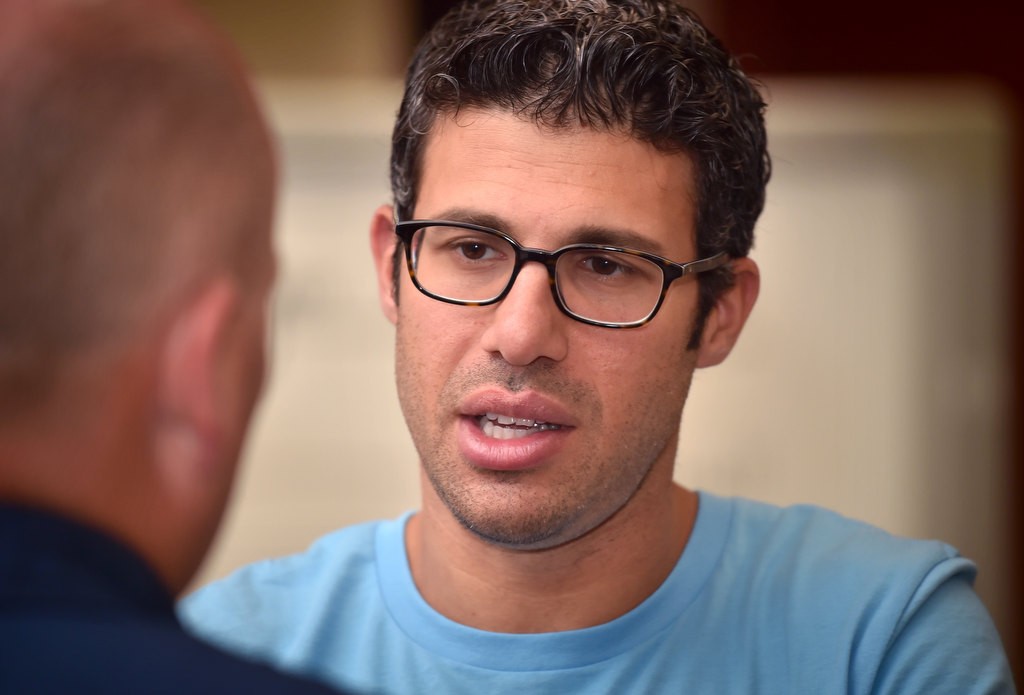Men don’t go to the doctor.
They just don’t, said Dr. Faysal Yafi, speaking to a group of Anaheim Fire & Rescue personnel last week at the North Net Training Center in Anaheim.
The seminar was put on to provide firefighters with factual medical information connected to men’s health issues and to debunk myths.
“People get fired up about firefighters and we want firefighters to get fired up about health,” said Elsa Covarrubias, community engagement manager with the city of Anaheim.
Sixty-percent of men will not see a physician even if they have a serious illness, said Yafi, a urologist and clinical professor in the Department of Urology at UC. Irvine Health.

Allen Hogue (center), deputy fire marshal for Anaheim Fire & Rescue, listens, along with other firefighters, to a presentation about men’s health issues.
Photo by Steven Georges/Behind the Badge OC
However, Yafi said two issues will get a man to the doctor’s office faster than you can say Viagra.
Those are: erectile dysfunction, commonly known as E.D., and difficulty urinating.
While these present themselves as quality-of-life issues, both can be signs of more serious medical conditions, Yafi said.
That’s why having a yearly physical is so important, the doctor said.
“Erectile dysfunction in younger men, for example, is the No. 1 predictor of cardiac problems in the future,” Yafi said. “One in four men in the U.S. has dealt with some erectile dysfunction at some point in their lives.”

Dr. Faysal Yafi, director of men’s health for UC Irvine Health, talks to Anaheim Fire & Rescue employees about men’s health issues during an educational talk at the North Net Training Center in Anaheim.
Photo by Steven Georges/Behind the Badge OC
E.D. can occur for a variety of reasons, including smoking, drinking alcohol, high blood pressure, stress and low testosterone levels.
Making lifestyle changes can help.
So can medications such as Viagra and Cialis or testosterone treatments.
Issues related to urinating such as a weak stream, difficulty starting to urinate, a sudden urge to go and going frequently throughout the night are typically related to an enlarged prostate, Yafi said.
“As men get older, their prostates get bigger,” he said. “When it grows to a certain point, it blocks the flow of urine from the bladder to the outside.”
Medications can help shrink the prostate.
But an enlarged prostate also can be a sign of prostate cancer.

Members of Anaheim Fire & Rescue gather at the North Net Training Center after an educational talk about men’s health issues.
Photo by Steven Georges/Behind the Badge OC
The good news is that prostate cancer, when discovered early, can be successfully treated in most cases.
Just ask actor Ben Stiller, whose prostate cancer was discovered by a blood test ordered by his regular physician, Yafi said.
Stiller had the tumor surgically removed in September 2014 and has been cancer free ever since, according to several news reports.
“It was caught early,” Yafi said. “Had it been caught late, the outcome may have been different.”
Blood tests once a year and a physical exam are the best preventers of prostate cancer, the doctor said.
“One is seven men will be diagnosed with prostate cancer in their lifetime,” he said.
James McDuffie, an Anaheim firefighter for 21 years, said the seminar was “absolutely, very informative” and he is planning to make an appointment to see Yafi.
“The more we are able to understand and prevent these things, the longer we will live,” McDuffie said.
 Behind the Badge
Behind the Badge




